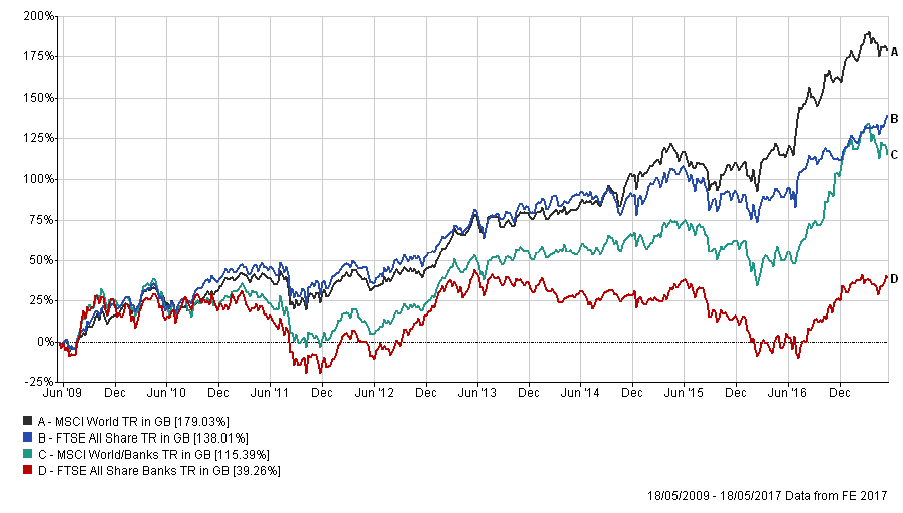“He who is not contented with what he has, would not be contented with what he would like to have” – Socrates.
Imagine taking your clothes to a Dry Cleaners, only to discover that the moment you hand them over the counter they are no longer yours [1]; the Dry Cleaning company can now lend them on to someone else. As time goes on, the Dry Cleaner becomes less stringent in choosing to whom to lend your Dry Cleaning, even to those who have a history of damaging or failing to return them. Pretty soon, nobody has any idea who “owns” your clothes, such that it is impossible to get them back. Should the original firm sustain losses on these “transactions”, the Government will be on hand to bail them out, however, so they don’t really need to take too much care about their lending processes.
Needless to say, a Dry Cleaning firm operating on these principles would soon be out of business, to be replaced with more honest operators; but that is precisely the model of the Banking System!
In what seems a never-ending cycle, the biggest UK Banks are once again mired in controversy (and fines) connected with previous (and in all likelihood present), “misdeeds”. While it is tempting to hang a few bankers (“Pour Encourager Les Autres”), this is currently frowned upon by the Authorities for some inexplicable reason. My first ever Blog post was about Coutts being caught mis-selling complex financial products and this week we learn that Lloyd’s Bank has been fined for flogging Structured Products to investors who were told these products were “low risk”- £80 million later, the Bank will no doubt move on. Meanwhile, Barclays are also in the mire, this time with the SEC, this time for eschewing the selling process altogether and going straight to over-charging for services not provided. Another £75 million to be written off against tax (assuming they make a profit of course). According to the Guardian, World Banks have racked up £252 BILLION between 2010 and 2015, in what is euphemistically called “Conduct Costs”, 26% of which UK Banks are responsible for. This is a staggering sum but it may only be the tip of the proverbial iceberg. In Europe, Deutsche Bank is now on trial in Italy for “running a criminal organisation” (which the Italians well know when they see one).
We posted an article on the banks a while back, warning that they may well be a “Value Trap”, whereby what looks ostensibly cheap, just keeps getting cheaper,; the chart below demonstrates this clearly, both here in the UK and Globally. The long term problem they have is that many of the basic functions of a bank are being overtaken by new developments- deposits, loans, fund transfers and so on can now be done on-line via Apps, Crowdfunding, Social Networks etc, making some of them appear redundant. Combine this with the collapse in trust and 5000-year lows in interest rates (which means that the opportunity cost of not having money in the bank is very low) and you have a recipe for potentially terminal decline.

According to the FTSE All Share Index Fact Sheet, Banks represent 26% of the Index and so have a big influence on share price movements. It has already had a major effect on the UK’s medium term under-performance vis-a-vis Global markets, and underscores the need to be globally diversified as well as just locally. Similarly, owning a broad spread of assets within a sector will help reduce idiosyncratic risk within the portfolio, namely the danger of one individual asset damaging overall returns- the Deep-water Horizon disaster cost BP (and its shareholders) massive sums, and the share price is still 26% below the closing price of the day before the event, under-performing the All Share Index by 75 percentage points in that period. If that serves as a warning to investors of the dangers of concentration risk, then all well and good. For many however, this is a lesson that they may need to learn directly themselves…
[1] As a bank depositor, you are legally an unsecured creditor– so if you go up to the Bank teller and ask for “your money” back, they can actually refuse! In practice, they would probably not do this, but the option is always there in extremis.
Disclaimer
We do not accept any liability for any loss or damage which is incurred from you acting or not acting as a result of reading any of our publications. You acknowledge that you use the information we provide at your own risk.
Our publications do not offer investment advice and nothing in them should be construed as investment advice. Our publications provide information and education for financial advisers who have the relevant expertise to make investment decisions without advice and is not intended for individual investors.
The information we publish has been obtained from or is based on sources that we believe to be accurate and complete. Where the information consists of pricing or performance data, the data contained therein has been obtained from company reports, financial reporting services, periodicals, and other sources believed reliable. Although reasonable care has been taken, we cannot guarantee the accuracy or completeness of any information we publish. Any opinions that we publish may be wrong and may change at any time. You should always carry out your own independent verification of facts and data before making any investment decisions.
The price of shares and investments and the income derived from them can go down as well as up, and investors may not get back the amount they invested.
Past performance is not necessarily a guide to future performance.




